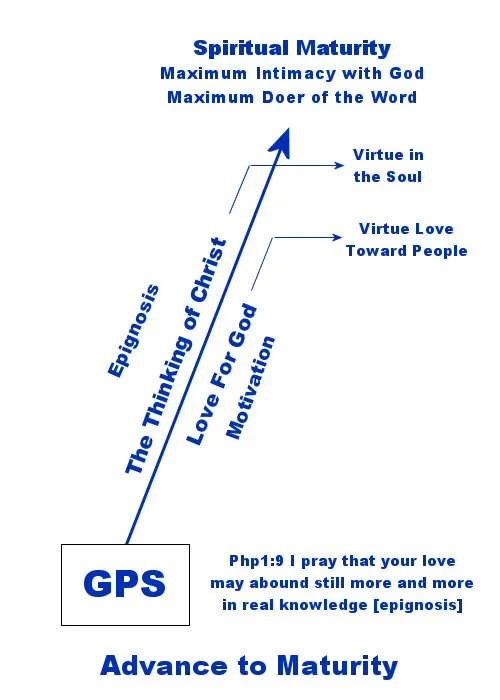Virtue Love
The Power of Virtue Love: Benefits of Thinking Like Christ
Virtue Love
Love is a very broad subject in the Bible, the entire scope of which cannot be covered on this web page. Links to detailed teaching on the subject of love are provided at the bottom of this page.
This page will mainly focus on love as it relates to our Lord’s second desire or objective for the human race, to come to the knowledge [epignosis] of the truth.
Love as discussed here only applies to the believer in Jesus Christ, the person who has met our Lord’s first desire, Believe in Me. Only the believer in Jesus Christ can have epignosis.

Love is the greatest virtue that a Christian can develop. This is stated in 1 Corinthians 13:
13:1Co 13:13 But now faith, hope, love, abide these three; but the greatest of these is love.
The Apostle Paul links epignosis, thinking with the mind of Christ, to our love in Philippians 1:9:
Php 1:9 And this I pray, that your love may abound still more and more in real knowledge [epignosis] and all discernment,
The Apostle John doesn’t use the word epignosis but he states the same principle in 1 John 4:16a:
1Jn 4:16a We have come to know and have believed the love which God has for us.
As shown on the Epignosis page, epignosis is God’s Word, the thinking of Christ, that we have learned and believed, i.e. have come to know and have believed. As shown on the Think Like Me page, the thinking of Christ in our souls is also called virtue. For us to understand what love is and then actually express that love requires the development of virtue in our souls.
Perhaps this diagram will help you understand how this love is developed in our souls.

We study the Bible on a consistent basis using the GPS, the Grace Perception System. The GPS is described in detail on the Epignosis page. It is the fulfillment of John 4:24:
John 4:24 God is spirit, and his worshipers must worship in the Spirit and in truth." NIV
In summary, we listen to the teaching of the truth while filled with the Holy Spirit and we believe what we learn. This results in epignosis, the thinking of Christ, virtue in our souls.
As we learn about God – about His essence, His love for us; about His grace expressed in the cross, in what He has provided for us to live the Christian life and what He has promised for eternity - the inevitable result of this is that we will return or reciprocate His love. We call this reciprocal love, an intimate mutual exchange of love between God and us – God first, then us. This is expressed in 1 John 4:19:
1Jn 4:19 We love, because He first loved us.
Our reciprocal love for God is our motivation to continue to study His Word and advance spiritually. The more we study His Word and learn about Him, the more our reciprocal love grows. The greater our reciprocal love, the more we are motivated to continue to study His Word. The thinking of Christ in our souls and our reciprocal love for God grow together so that we are motivated to continue our advance toward spiritual maturity in spite of all opposition, distraction, adversity or prosperity.
There are 2 passages of Scripture that relate this to John 4:24 and the GPS; Romans 5:5 and 1 John 2:5a. The structure of the Greek in both of these verses indicate they should be translated love for God, not love of God.1 They are referring to our reciprocal love for God, not His love for us.
1Jn 2:5 but whoever keeps his word, in him truly love for God is perfected. RSV
We must know God before we can have love for God. We come to know God through His Word, through the thinking of Christ in our souls. When we obey His Word in response to His love for us, we are motivated to continue our advance to spiritual maturity.
Rom 5:5 and hope does not disappoint, because the love of [for] God has been poured out within our hearts through the Holy Spirit who was given to us.
The ministry of God the Holy Spirit is the basis of the GPS. There is no epignosis, therefore no virtue love, without the Holy Spirit. Also, His enabling power in us is the means of the outpouring of love toward God from our souls (Galatians 5:22).
The diagram shows that the result of the continued intake of the thinking of Christ into our souls is the development of virtue in the soul. The most important result of that virtue is virtue love directed toward God, our reciprocal love for God. One of the greatest results of reciprocal love for God is an intimate relationship with Jesus Christ. Because His thinking is our thinking, He becomes the central focus of our lives.
As our reciprocal love for God grows in our advance to spiritual maturity, we then have the ability to express that virtue love toward people. The expression of virtue love toward people is one of the greatest manifestations of being a doer of the Word.
The Word of God is alive and powerful (Hebrews 4:12) even when it’s in the believer’s soul. Believers are doers of the Word, not just hearers, when they express the Word of God in their souls as virtue love.
In my opinion, the number one reason why God our Savior Jesus Christ wants us to come to the knowledge [epignosis] of the truth, to think like Him, is love. This is brought out in 1 John 3:23:
1Jn 3:23 This is His commandment, that we believe in the name of His Son Jesus Christ, and love one another, just as He commanded us.
This actually states 2 commandments from God the Father.
First: that we believe in the name of His Son Jesus Christ. That is Jesus Christ’s first desire: Believe in Me.
Second: love one another.
As shown above, love comes from epignosis, the thinking of Christ, in our souls. God the Father wants us to believe in His Son and to think like His Son; the number 1 expression of thinking like His Son being love.
An important statement in that verse is just as He commanded us. That is referring to Jesus Christ. He commanded us to love in many passages of Scripture.
He stated the importance of love directed toward God in Matthew 22:37&38:
Mat 22:37 And He said to him, " 'YOU SHALL LOVE THE LORD YOUR GOD WITH ALL YOUR HEART, AND WITH ALL YOUR SOUL, AND WITH ALL YOUR MIND.'
Mat 22:38 "This is the great and foremost commandment.
The greatest and foremost thing we must do is develop a love for God. And notice where that love is – heart, soul, mind. It is an expression of our thinking.
Jesus Christ stated His love for God the Father in John 14:31:
John 14:31a but so that the world may know that I love the Father, I do exactly as the Father commanded Me.
We must love God the same as Jesus Christ did. How do we do this?
1Jn 2:5a but whoever keeps his word, in him truly love for God is perfected. RSV
Only when we keep His Word, think like Jesus Christ, can we have a true love for God.
Jesus Christ also stated another direction for our love in Matthew 22:39:
Mat 22:39 "The second is like it, 'YOU SHALL LOVE YOUR NEIGHBOR AS YOURSELF.'
It comes as no surprise that the other direction for the expression of love is toward people. Our Lord expresses His love toward people when He states that He loves us.
Joh 15:12 "This is My commandment, that you love one another, just as I have loved you.
He restates His command for us to love each other in John 15:17:
Joh 15:17 "This I command you, that you love one another.
The Apostle John was present when Jesus Christ stated that command and as mentioned above, he passes our Lord’s command on to us.
1Jn 3:23 This is His commandment, that we believe in the name of His Son Jesus Christ, and love one another, just as He commanded us.
How can this love that Jesus Christ had be described? The greatest description of love in the Bible can be found in 1 Corinthians 13:4-7:
1Co 13:4 Love is patient, love is kind and is not jealous; love does not brag and is not arrogant,
1Co 13:5 does not act unbecomingly; it does not seek its own, is not provoked, does not take into account a wrong suffered,
1Co 13:6 does not rejoice in unrighteousness, but rejoices with the truth;
1Co 13:7 bears all things, believes all things, hopes all things, endures all things.
Since the content of the Bible is the thinking of Christ and since we have shown that Jesus Christ loved while on the earth, we might interpret verses 4-6 in this way:
Jesus Christ was patient; Jesus Christ was kind and was never jealous; Jesus Christ did not brag and was never arrogant,
Jesus Christ did not act dishonorably; He did not seek to always get His own way; He was never provoked to anger; He never reacted to a wrong that He suffered,
Jesus Christ did not rejoice in evil but rejoiced with the truth.
We have no idea what Jesus Christ looked like, but we certainly know what His attitude was in life and how He dealt with other people. He would have been a wonderful person to be around.
As I stated above, I believe that the number one reason why Jesus Christ wants us to think like He does is so that we can have the same virtue love that He did. When we are like-minded with Christ, we can express love in the same way He did. We can never achieve perfection therefore we can’t do it perfectly like He did. However, we can have a reasonable facsimile of it.
Why would Jesus Christ want us to have this love? What are some of the results of it?
First, let’s look at the results of our reciprocal love for God. We’ll start with a verse from Scripture that is often quoted; Romans 8:28:
Rom 8:28 And we know that all things work together for good to them that love God, to them who are the called according to his purpose. KJV
That is from the King James Version of the Bible which at one time was the most common English translation available. I have heard many people quote just one little part of that verse: all things work together for good. They have no way to explain the adversity or misery in their life so they just shrug it off: all things work together for good as if somehow things will magically just turn out well.
But look what comes next in the verse: to them that love God. We have just seen that according to the Scripture, the only ones who love God are the ones who have the thinking of Christ, virtue, in their souls. That is depicted in the Advance to Maturity diagram above. The only people who all things work together for good are believers in Jesus Christ who have the thinking of Christ in their souls and have developed reciprocal love for God.
Another important thing about this verse is that in the structure of the original Greek, God is actually the subject of this sentence. This is brought out in the NASB translation:
Rom 8:28 And we know that God causes all things to work together for good to those who love God, to those who are called according to His purpose.
All things don’t just magically work together for good; God causes all things to work together for good. For whom? For those who love God. This is really an expression of the intimate relationship we develop with God as we advance to spiritual maturity and our reciprocal love for Him grows and grows. We can have confidence that God is working all things in our lives, whether prosperity or adversity, for good, for out benefit.
Another verse that expresses a result of our reciprocal love for God is 1 John 4:18:
1Jn 4:18 There is no fear in love; but perfect love casts out fear, because fear involves punishment, and the one who fears is not perfected in love.
In this context, the Greek word translated perfect and perfected is better rendered completed or finished. It is referring to achieving spiritual maturity. The phrases can be translated mature love casts out fear and not matured in love.
What are you afraid of? Do the events going on in this country and around the world make you afraid? Are you afraid of flying, of death? When we have confidence that God works all things together for good for us, we have no reason to fear anything. It is only reciprocal love for God that comes from the thinking of Christ in our soul that can cast out fear. Jesus Christ desires for us to depend on Him and live a life without fear.
Another reason why Jesus Christ wants us to develop virtue love involves our relationship with people.
People can be the greatest source of conflict, misery and anguish in our lives. We can react to people with the mental sins of impatience, unkindness, anger, hatred, jealousy, bitterness, self-centeredness, implacability, vindictiveness. Of course, these mental attitude sins can lead to what are referred to as sins of the tongue; gossiping, maligning, slandering, judging, lying. These can eventually lead to the devastation of overt sins such as taking revenge, violence and even murder.
Virtue love toward people, as described in 1 Corinthians 13:4-7 above, frees us from these things and allows us to live a relaxed life of happiness, contentment and peace with those people we come in contact with on a daily basis.
An attitude of virtue love, including confidence in God and a relaxed mental attitude toward people, is the only way we can be effective ambassadors for Jesus Christ and fulfill our mission stated in 2 Corinthians 5:20:
2Co 5:20 We are therefore Christ's ambassadors, as though God were making his appeal through us. We implore you on Christ's behalf: Be reconciled to God. NIV
Conclusion
This briefly demonstrates the love we can have when we fulfill our Lord’s second desire for the human race – Think Like Me.
Detailed studies on virtue love:
The Unfailing Love of God by RB Thieme Jr. Contact RB Thieme Jr Bible Ministries.
Rev. RB Thieme III taught virtue love in detail in his 1 Corinthians series, lessons 401_812 to 401_917. It includes most of the material from his father’s book The Unfailing Love of God plus a detailed exegetical teaching of 1 Corinthians 13:1-8a. You can order these lessons by contacting Berachah Church.
- Footnotes:
- 1. R. B. Thieme, Jr., “The Love of God and the Love for God” in The Unfailing Love of God, (Houston: R. B. Thieme Jr., Bible Ministries, 2009), 79-81.
